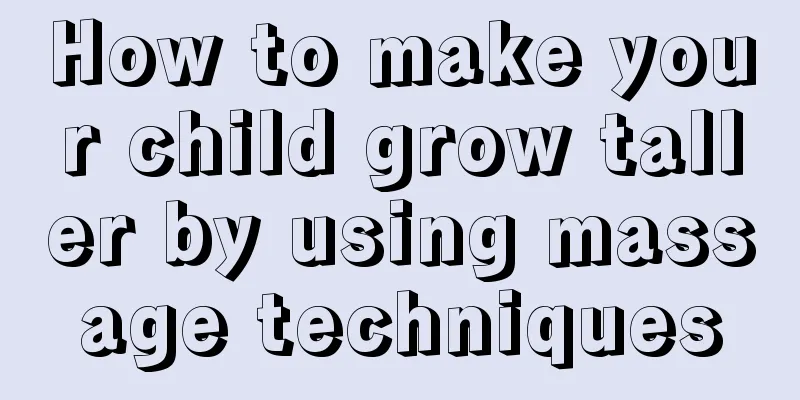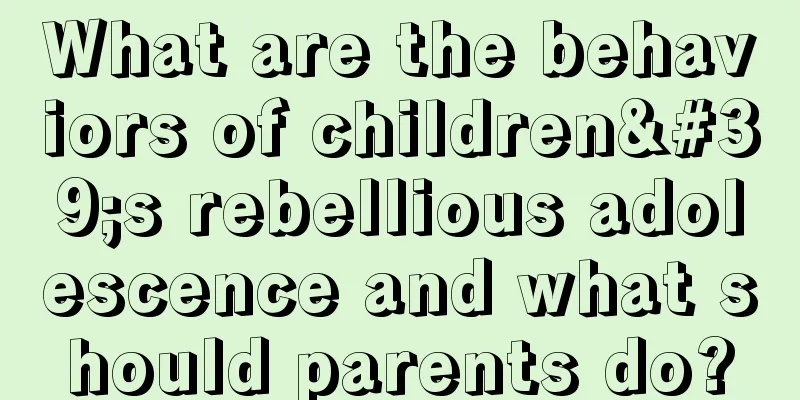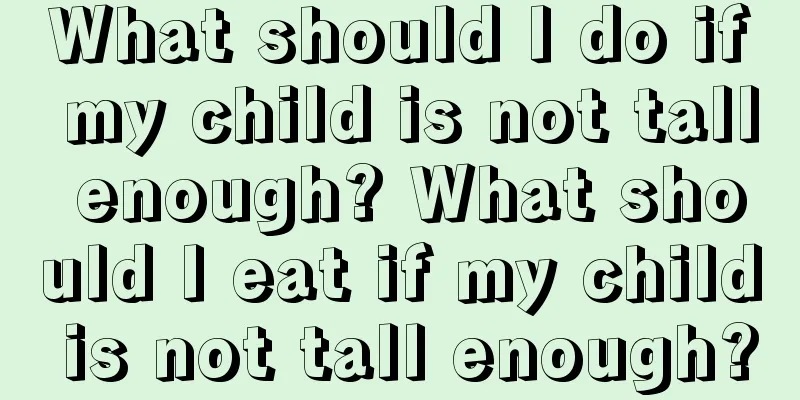When is the best time to have a baby? What is the best age to have a baby?

|
Newlyweds want to have children at the most appropriate age, so what is the best age for men and women to have children? Today, let's talk about the best time to have children. Fertility time analysis"Early birth, early relief" school A report released by the United Nations shows that 70 million underage girls become pregnant every year around the world, and more than 7 million underage girls become pregnant every year in developing countries, of which 2 million are under the age of 15. Although women are capable of reproduction after the onset of menstruation, this does not mean that their reproductive organs have matured. Pregnancy under this circumstance will cause the fetus to compete with the mother for nutrients, making it impossible for both mother and baby to grow healthily. In addition, the chance of congenital malformations in babies born at this time is also very high. In addition, premature pregnancy can easily affect the corpus luteum function that helps the fetus develop due to imperfect endocrine function, causing miscarriage or premature birth in pregnant mothers! ? "I want to have more children, I am willful" group Women over 35 years old are considered elderly mothers during pregnancy. At this stage, the pregnant mother's physical function, physical strength, and uterine contraction force have declined, so the risk of pregnancy is higher than that of women of childbearing age. Because the eggs of older mothers may be aging, when the chromosomes of the eggs do not separate, the fetus is very likely to be deformed. The proportion of birth defects born to older mothers in my country has increased year by year, from 3.9% in 2000 to 9.29% in 2013! In addition to congenital malformations of the fetus, the probability of miscarriage and stillbirth in older mothers is also very high! According to data from the American College of Obstetrics and Gynecology, the probability of spontaneous abortion in women over the age of 45 is over 90%. Junjun has analyzed two of the main reasons for you: First, the uterus and other organs of older mothers are to a certain extent older than those of women of childbearing age. Therefore, they are slightly less capable of delivering nutrients to the fetus than women of childbearing age, which increases the chance of miscarriage. Secondly, the joints of the ischium, pubis, ilium and cuboid bones of older mothers have basically ossified, forming a fixed pelvic cavity. Therefore, it is very easy to have complications during delivery, such as heavy bleeding, amniotic fluid embolism, etc. It is also more likely to cause fetal distress, heart and brain hypoxia, and even suffocation, thus increasing the probability of stillbirth. ?Traditional marriage and childbirth Theoretically, women between the ages of 15 and 49 are fertile, but the fertility of each age group is different. The fertility is the strongest around the age of 25! Therefore, mothers who want to prepare for pregnancy are best to choose the age group of 23-30 years old, because it is easy to conceive at this stage and all physical indicators are very suitable for pregnancy. For example, the quality of women's eggs during this period is high, and the probability of premature birth, miscarriage, and deformed babies is relatively low; for example, the soft birth canal has good stretchability, the uterus has strong contraction force, and the chance of dystocia is small. Moreover, the pregnant mother's body has a strong tolerance during this stage, which can create a good environment for the fetus and is conducive to the development of the fetus. No matter what age you are when you get pregnant, mothers must have regular prenatal checkups! Regular prenatal checkups! Regular prenatal checkups! When is the best time to give birth?my country's regulations on late marriage and late childbearing point out that women who get married over the age of 23 are considered late marriages; married women who get pregnant and give birth to their first child after being over 24 years old or after late marriage are considered late childbearing. However, there are still women giving birth too early in some areas. Giving birth too early is a high-risk factor for pregnant women. Generally speaking, pregnancy before the age of 20 is a high-risk pregnancy, which has a great impact on future physical health, and some may even cause lifelong infertility. At a young age, reproductive organs such as the uterus have not yet developed fully. If a child is born at this time, the mother may be unable to bear the heavy load, and is more likely to have miscarriage, premature birth, fetal malformation, and low birth weight (weight less than 2.5 kg). In addition, if a woman gives birth too early, she will be sensitive to external pathogens, which will cause various gynecological diseases and a significantly increased risk of cervical cancer. Moreover, teenage pregnancy will also bring dangers to the children she gives birth to. Studies have shown that children born to mothers under 20 are 50% more likely to suffer stillbirth or neonatal death within the first week or month after birth than those born to mothers aged 20 to 29. Low birth weight is also common, which will have long-term effects on the child's growth. Delayed childbirth poses great risk to mother and baby Data shows that the older the pregnant woman is, the greater the chance of giving birth to a child with congenital idiocy: the chance of giving birth to a child with congenital idiocy at the age of 24-29 is 1/1500, while at the age of 35-39, there is a 1/250 chance of giving birth to a child with congenital idiocy, 1/60 at the age of 40 and above, and as high as 1/40 at the age of 45. Current medical theory still defines: pregnant women over 35 years old are "old". Pregnant women over 35 years old must undergo routine prenatal diagnosis and be treated as high-risk pregnancies. In fact, giving birth at an advanced age is dangerous to both the mother and the child, so giving birth at an advanced age is not recommended. Women aged 24-35 are more suitable for childbearing Many experts disagree on the best childbearing age. Some believe that 24-29 is the best childbearing age, and 25-30 is the best childbearing age. However, some experts believe that the marriage age of women is generally postponed, so 24-35 is also a more appropriate childbearing age. At the age of 24, women are basically fully developed, their bones are fully calcified, and their pelvis is wider, which is suitable for pregnancy and childbearing. After this age, the secretion capacity of the mammary glands will decrease, which can explain why many mothers do not have enough milk. However, whether it is 24 or 35 years old, experts believe that having children too early or too late is not good for women. What is the smartest age for couples to have children?The best reproductive age for men: 30-35 years old When it comes to fertility, scientists focus on genetics. The research results of French geneticist Maurice show that the offspring born by men aged 30-35 are the best. The quality of male sperm reaches its peak at the age of 30 and then can maintain high quality for 5 years. What is the smartest age for couples to have children?The best childbearing age for women: 23-30 years old The best age for women to have children is between 23 and 30 years old. During this period, women's whole body development is fully mature, the quality of eggs is high, and if they become pregnant and give birth, the risk of delivery is low, the fetus grows and develops well, and the incidence of premature birth, deformed babies and dementia is the lowest. Couples in this age group have rich life experience, abundant energy, and are capable of raising infants and young children. If a woman becomes pregnant and gives birth too early, the fetus will compete with the developing mother for nutrition, which is not good for the mother's health and the fetus's development. At what age is it wisest for couples to have children? The best reproductive combination: the man is about 7 years older than the woman It is not difficult to see that the optimal age combination for male and female fertility is that the former is about 7 years older than the latter. The father is older and his intelligence is relatively mature, so he can pass on more "codes" to the next generation; the mother is young and has strong vitality, which will create a better breeding environment for the fetus, which is conducive to the development and growth of the fetus. Therefore, the offspring born from this "optimal combination" are more likely to be "geniuses". |
<<: Do I need to shave my pubic hair after giving birth? Is it necessary to shave during childbirth?
>>: How to take care of your baby's drooling? Dietary treatment for your baby's drooling
Recommend
What are the symptoms of infantile intestinal spasms? Signs of intellectual retardation in babies
Babies are too young and often cry when they feel...
How much milk does a baby eat in the first 3 days after birth?
For friends who have just become parents, they ar...
How often should the baby's earwax be cleaned? What are the consequences of having too much earwax on the baby?
When babies are young, their organs are relativel...
When does the 13 years of free education refer to? Which 13 years of free education refer to?
When I was graduating from junior high school, th...
When is the sex of the fetus determined? The sex of the fetus mainly depends on these 3 points
Whether to have a boy or a girl is a problem that...
Can I eat ginseng fruit during breastfeeding? Is it good to eat ginseng fruit during breastfeeding?
Diet during breastfeeding is very important, beca...
How old is a child's rebellious period? How long does it take for a child to recover from the rebellious period?
The rebellious period of children is a headache f...
How to train children's hand flexibility? 6 stages of hand-skill games to strengthen finger flexibility
After children go to kindergarten, they start a s...
Can newborns with jaundice eat Coptis chinensis? Can newborns with jaundice bask in the sun through glass?
It is a common phenomenon for newborns to suffer ...
What are some healthy snacks for kids? What snacks are suitable for children?
What children like to eat may not necessarily be ...
Where can I apply for a child health handbook? How can I get a replacement if I lose it?
The Child Health Handbook records the physical he...
Does caries in deciduous teeth affect permanent teeth?
Does caries in baby teeth affect permanent teeth?...
What brand of skin care products is good for breastfeeding? Does using skin care products during breastfeeding have any effect?
Skin needs care at all times. The methods of skin...
Will the birthmark on the baby disappear as he grows up?
Mothers usually discover birthmarks a few weeks a...
Can pregnant women eat yellow sprouts? There are many benefits of eating them properly
Pregnant women can eat yellow sprouts. Yellow spr...









